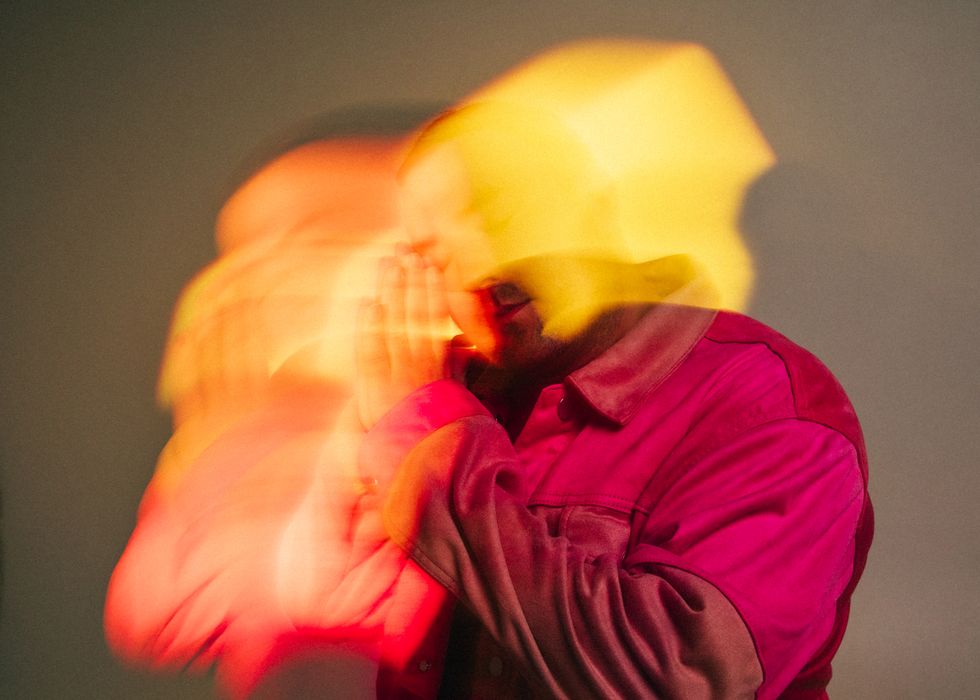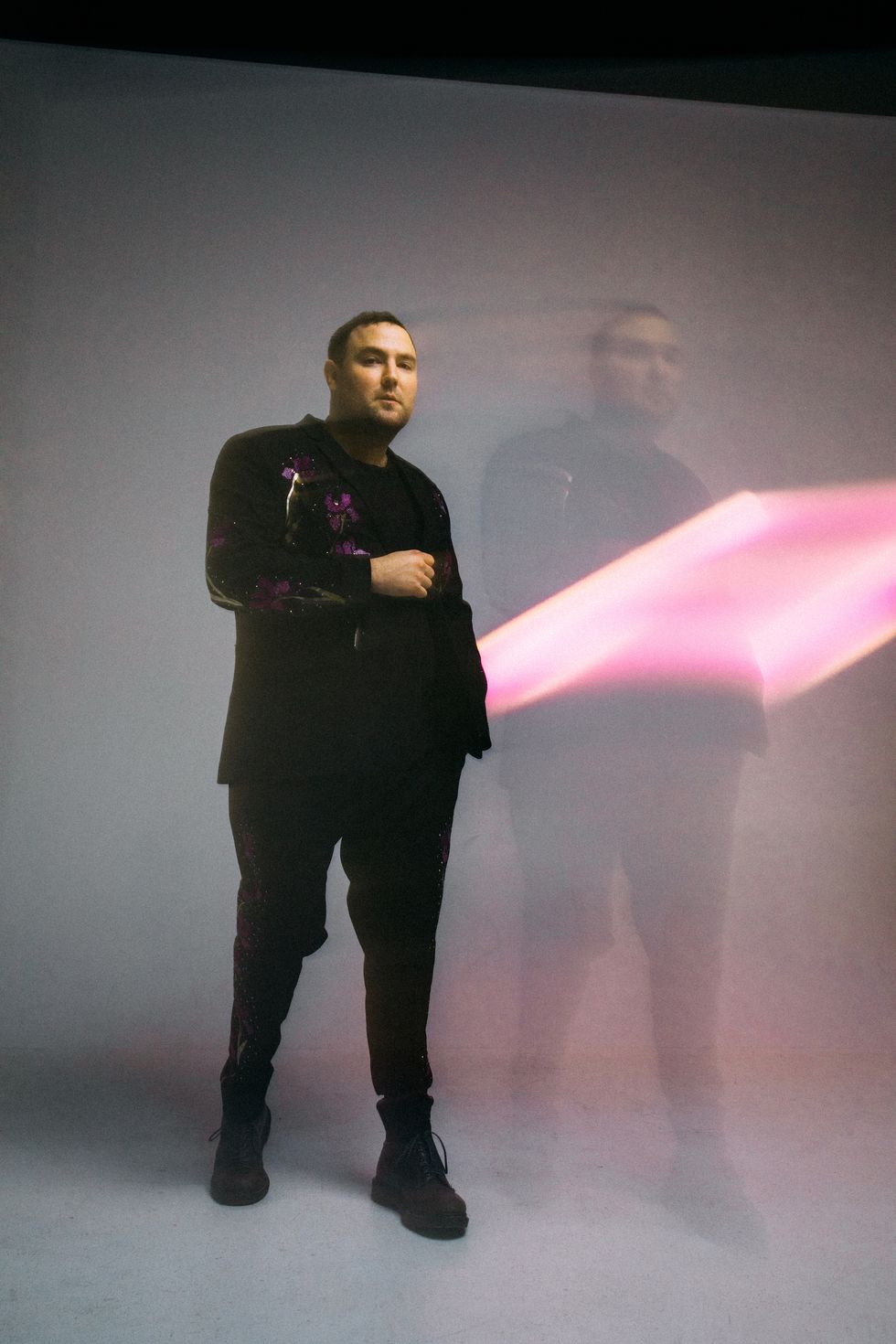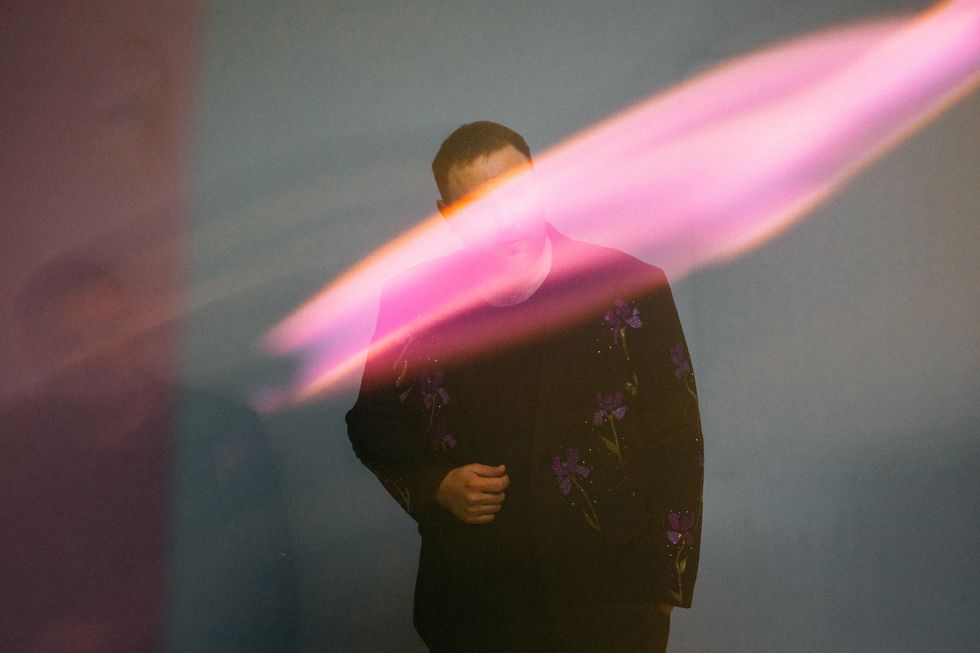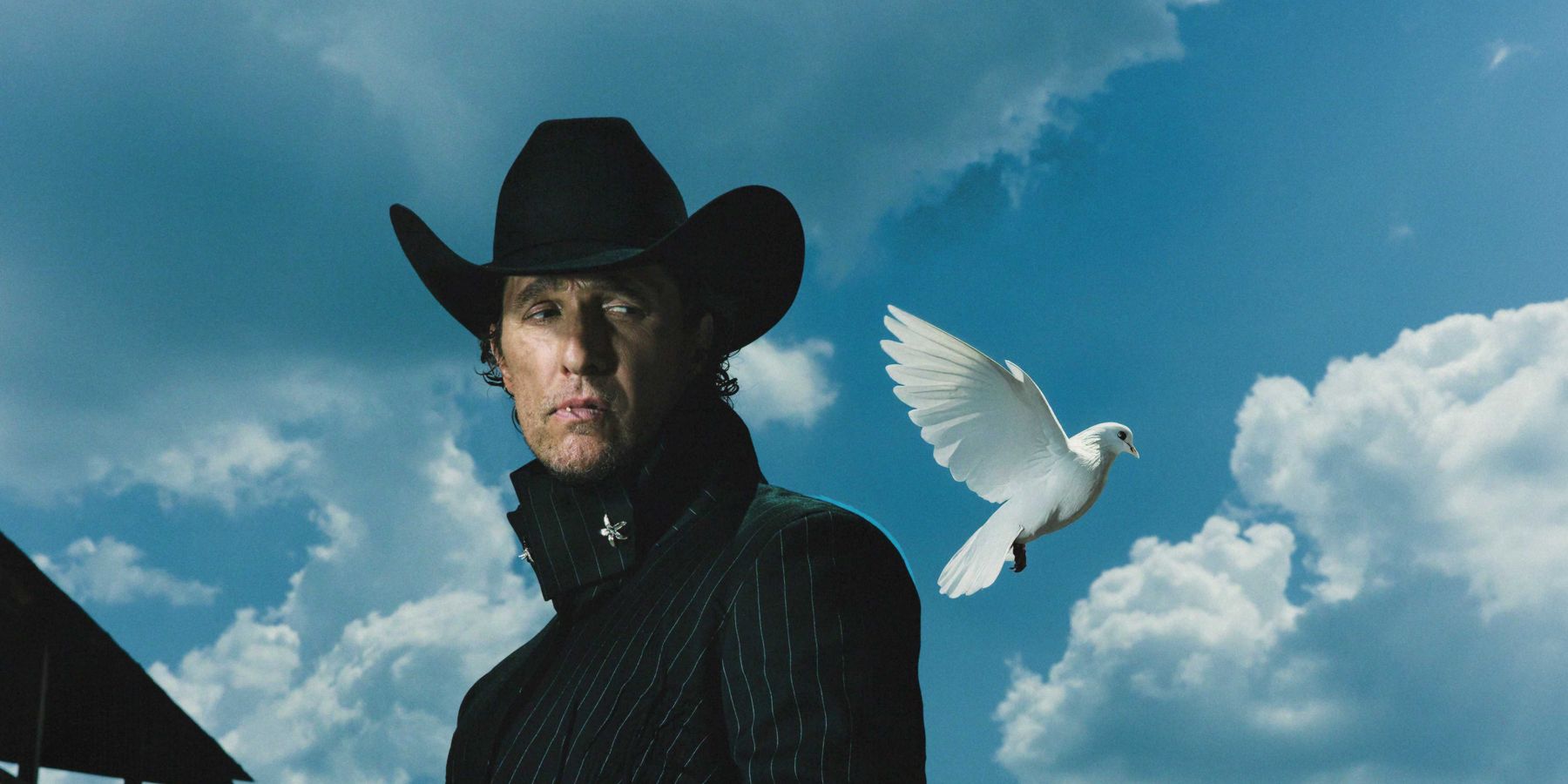
Morgxn Takes the Long Way Home
Jan 24, 2024
When I first met Morgxn, he was basking in the glow of a chart-topping album. We were at a beach festival in mid-November, just months before the pandemic would shut down the music industry and (what we assumed at the time) our dreams. We connected instantly over our penchant for over-the-top fashion and Xs where As should be in our online handles. Standing in the sand, recording an on-camera interview, our glitter, fringe and boots a stark contrast to our surroundings, it's no surprise we hit it off instantly. Speaking to PAPER from his home in Nashville, Morgxn traveled back to that time.
"That moment was at the end of 2019," Morgxn says. "I'm just coming off my top 10 record [Vital ]. I'm touring the world and playing a show in Florida. We had the greatest time. I had on a great outfit, I think it had fringe. Patti Smith has this saying that whatever you're doing on New Year's Eve sets the tone for the future you're calling it. I remember [the next month] I was in Joshua Tree and I had sex with this random person. I was like, ‘Yes, 2020. It's my year!’ Then boom, we all know where we were. It was not a fun time. But it also, in retrospect, it has been a pretty incredible journey."
That journey plays out in Morgxn’s latest album, Beacon, as he details the struggles, epiphanies and ecstasies that dotted his path home – not necessarily back to his hometown of Nashville, Tennessee, but back to himself.
After the global shutdown hit, the singer-songwriter was dropped from his label. That same day, Billie Eilish cosigned his song "Home" by adding it to her list of tracks that had inspired her mammoth hit, "Bad Guy." The contrasting highs and lows were staggering for Morgxn, but he persevered, deciding to release his music independently.
"The song I ended up putting out was "Wonder," he says. "That song that I owned went viral on every platform. It changed my life and it also changed the way that I do and think about music." Still, even with his glittery, cathartic, self-released anthem validating his ability to move forward, his biggest hit, "Home," was thematically calling him back to his roots. "I've been singing about home for so long," he says. "The thing that terrifies me the most is actually coming back home. I was like, 'I need to confront the biggest demon I have in my life and that's moving home.'"
Below, Morgxn talks to PAPER about returning to himself and his hometown of Nashville and how his hero's journey led him to create his most vulnerable album yet with Beacon.

Leading up to recording Beacon, you decided to move back to your hometown of Nashville, Tennessee. Why did you make that decision and what were you dealing with emotionally?
To be honest, it was the biggest defeat of my life. I came home and the first song I wrote was “Beacon,” on my childhood piano. It makes me emotional, because that opening line, “Where do we begin / You think your loss my friend,” was me talking to myself, wondering how I was going to pick up the pieces. When I got back here, [people were fighting for] a woman’s right to choose and I’m immediately downtown singing my song “Pretend Rainbow” in front of the Capitol. Then, trans healthcare was on the chopping block here. I remember someone saying, “I never see you out; I only see you at rallies.” I didn’t go out unless I was fighting for someone’s rights. Nashville is a battleground for hope as a revolution and hope as something radical. Being here right now feels right.
I’ve had other artists from Nashville say something similar. They can impact change there, but in New York and Los Angeles, they’re just preaching to the choir.
I opened for the trans poet Alok, and we went out after the show. I was like, ‘What’s New York and LA like for you right now?’ and I don't want to put words in their mouth, but it was something like, 'New York and LA are wonderful places, do not get me wrong. Do not misquote this, but to be queer in the South and to be anything other in the South means you are constantly up against a very loud and very angry mob of people who are scared about who you are as a person. Your existence as a queer body, as a brown body, as a woman body, is scary to people who are in power and now have to face that we're only getting louder.' I got an opportunity to sing at a John Prine tribute concert. I don’t know how many queer artists have stood on stage at the Country Music Hall of Fame singing John Prine songs with John Prime's band invited by John Prine’s wife. This is the revolution. This is what is happening right now. It feels thrilling.

What was it like to have Nashville as the backdrop of your creative process as you recorded Beacon?
I came here to Nashville to confront pieces of my heart and rebuild my sense of home. I've been thinking about home and singing about home for so long, but I didn't really know what that meant for me, to have a home and a place that made me feel safe. I never would have imagined that I would have written a ballet and performed it with the Nashville Ballet here, that I would meet somebody that I would fall so madly in love with and be so excited to make a life with this person. I never set out to make an album. I just started living my life. This is what came from it.
This album follows the hero's journey and I’m the central character. I knew that “Beacon” was track one because it starts with: “Where do we begin.” The last song in the album is “Where I’m From,” and it has the last voicemail I ever received from my father. It ends the album, this coming home. The song right before that, “Getting Older (In a Modern Time),” I’m sitting in my room and thinking about the word "home" and thinking about my life. These songs are just from living my life.
Speaking of the track “Beacon,” why did you decide to make it not just the album opener but title as well?
John Lennon said, “Life is what happens when you’re busy making other plans.” I thought the album would actually be called Backbone. The day my dad passed in 2015, it was sudden and really hard, and I picked up a blank journal and wrote the word “backbone.” I also wrote later that day that I felt a sense of freedom after he passed, because I grew up feeling like a man was supposed to be this very specific image. I felt freed from that. But backbone was this word that haunted me, honestly, for eight years. I was like, “Do I need a backbone? Or my dad didn't have a backbone? What did it mean, what does it mean to be strong when you’re falling apart?" It took eight years for me to write that song, it came through, but you can’t rush it. So for a while, I thought the album was called Backbone. But "beacon" is in the word "backbone." And it [reminds me] that sometimes you’re the light radiant being, but other times you’re lost at sea, and you need the beacon. This is my album where I am on a boat at sea and I’m trying to hold on to hope and navigating my way through it. Beacon kind of pushed through the fog and became the album title.

Your song “Young and in Love” feels like a real love song because it's honest and messy. Why did you feel like it was important to share on Beacon?
Honestly, I think that “Young and in Love” is the best love song I've ever heard because it’s so real. I used to have somebody at my old label who was like, Morgxn never writes a love song. And it’s like, “No, I don't because I'm not in love.” But I am so in love with my partner, Gabriel. He is an out of this world creature to me, and we bought land outside of Tennessee that we're turning into a queer farm that will grow fruits. He's actually out looking at trucks right now, which like, I have never had on the bingo card for Morgxn for sure. I know it's messy. It's vibrant, it's loud. I've heard straight people and gay people screaming it at the top of their lungs. I think if love isn't messy, it's not real.
When listeners have a chance to listen to this album from start to finish, what do you hope they walk away with?
I've seen a lot of videos created for the songs of people already. Somebody just used “My Revival” and was [talking about] when the chapters ended and you're afraid to walk away but you do and it's a whole new blossoming in the wake of it. I hope that this album is something you would put on in your car as you're driving towards your next getaway. You know what I mean? You hear the first lyrics, “Where do we begin” as you go about the greatest adventure of your life... whatever that is.
Photography: Anna Haas
From Your Site Articles
Related Articles Around the Web
MORE ON PAPER
ICONOS: Pepe Aguilar, El Oficio del Tiempo, la Voz del Silencio y el Peso del Legado
Español
Jan 19, 2026
Entertainment
Cynthia Erivo in Full Bloom
Photography by David LaChapelle / Story by Joan Summers / Styling by Jason Bolden / Makeup by Joanna Simkim / Nails by Shea Osei
Photography by David LaChapelle / Story by Joan Summers / Styling by Jason Bolden / Makeup by Joanna Simkim / Nails by Shea Osei
01 December
Entertainment
Rami Malek Is Certifiably Unserious
Story by Joan Summers / Photography by Adam Powell
Story by Joan Summers / Photography by Adam Powell
14 November
Music
Janelle Monáe, HalloQueen
Story by Ivan Guzman / Photography by Pol Kurucz/ Styling by Alexandra Mandelkorn/ Hair by Nikki Nelms/ Makeup by Sasha Glasser/ Nails by Juan Alvear/ Set design by Krystall Schott
Story by Ivan Guzman / Photography by Pol Kurucz/ Styling by Alexandra Mandelkorn/ Hair by Nikki Nelms/ Makeup by Sasha Glasser/ Nails by Juan Alvear/ Set design by Krystall Schott
27 October
Music
You Don’t Move Cardi B
Story by Erica Campbell / Photography by Jora Frantzis / Styling by Kollin Carter/ Hair by Tokyo Stylez/ Makeup by Erika LaPearl/ Nails by Coca Nguyen/ Set design by Allegra Peyton
Story by Erica Campbell / Photography by Jora Frantzis / Styling by Kollin Carter/ Hair by Tokyo Stylez/ Makeup by Erika LaPearl/ Nails by Coca Nguyen/ Set design by Allegra Peyton
14 October
Entertainment
Matthew McConaughey Found His Rhythm
Story by Joan Summers / Photography by Greg Swales / Styling by Angelina Cantu / Grooming by Kara Yoshimoto Bua
Story by Joan Summers / Photography by Greg Swales / Styling by Angelina Cantu / Grooming by Kara Yoshimoto Bua
30 September




